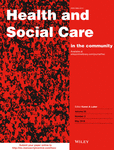Care and support for older adults in The Netherlands living independently
Funding information
This work was supported by the Netherlands Organization for Health Research and Development (ZonMw) [grant number 80-83505-98-004].
The study is embedded in the “academic collaborative centre on supervision” (AWTDutch acronym) in 2011. Here, four different research institutions work together with the IGZ during a 4-year period in order to develop evidence-based supervision. The current study is executed by the EMGO+ Institute/VU medical centre in close collaboration with the IGZ, in order to link research and practice.
Abstract
The growth in the numbers of older adults needing long-term care has resulted in rising costs which have forced the Dutch government to change its long-term care system. Now, the local authorities have greater responsibility for supporting older adults and in prolonging independent living with increased support provided by the social network. However, it is unclear whether these older adults have such a network to rely upon. The objective of this study was to gain insight into the providers of formal and informal care to older adults, and to assess possible differences between older adults who are frail and those who are not. In addition, we investigated their care and support needs. We used data from a quantitative survey using a cross-sectional design in different regions of the Netherlands from July until September 2014 (n = 181). Frailty was measured using the Tilburg Frailty indicator. To analyse the data chi-square tests, crosstabs and odds ratios were used for dichotomous data and the Mann–Whitney U-Test for nominal data. The number of formal care providers involved was significantly higher (median = 2) for those deemed frail than for those not deemed frail (median = 1), U = 2,130, p < .005. However, more than one-third of the respondents deemed frail did not get the care or support they needed (33.7%). There was a significant positive association between being frail and having an informal care provider (χ2 = 18.78, df = 1, p < .005). However, more than one-third of those deemed frail did not have an informal care provider (36.8%). One-third of older adults deemed to be frail did not have their needs sufficiently addressed by their care network. For a substantial part of this group of older adults, the informal network seems to be unable to support them sufficiently. Additional attention for their needs and wishes is required to implement the policy reforms successfully.
CONFLICT OF INTEREST
The researchers declare they do not have any competing interests.




